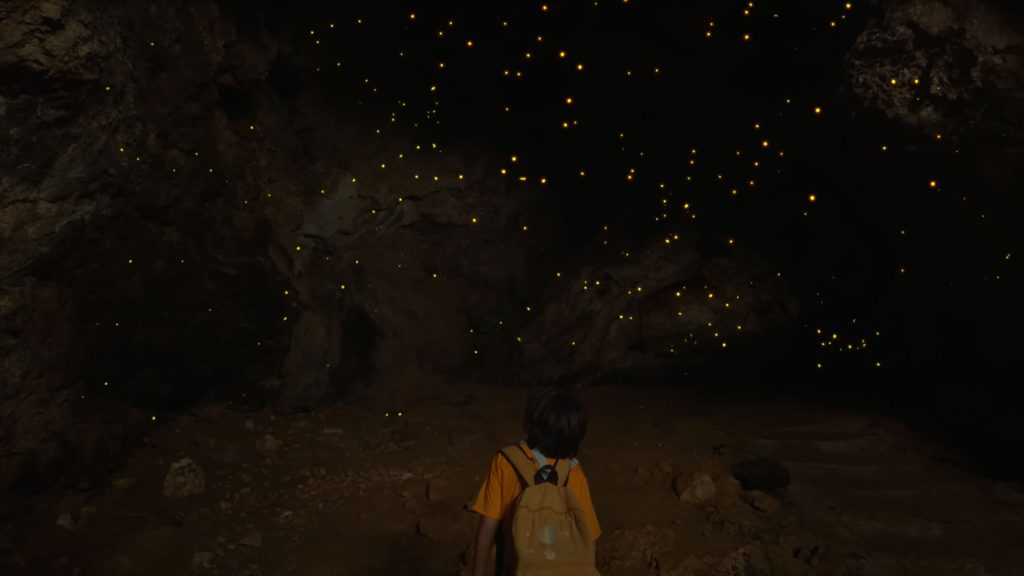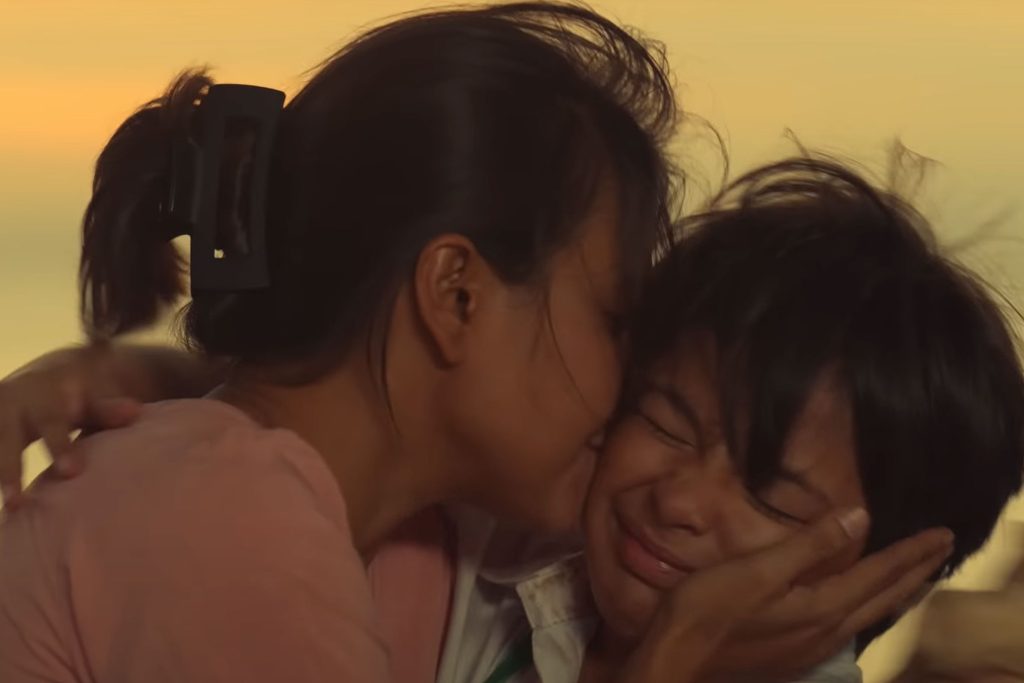MANILA, PHILIPPINES — Firefly tackles a young boy’s journey towards a mystical island full of fireflies with nothing but his mother’s stories to guide him. Despite little to no buzz ahead of its screening, the film won Best Picture at the 2023 Metro Manila Film Festival (MMFF), pushing it from being screened by the least number of cinemas at the start of the festival to over 100 movie houses nationwide — intriguing more Filipinos to check out a story that’s not very common during the annual film fest.
Firefly is directed by Zig Dulay under GMA Pictures, director of 2022 hit Filipino historical fantasy Maria Clara at Ibarra, among other notable works. The film stars Euwenn Mikael Aleta (2023 MMFF Best Child Performer) as the boy, Tonton, and Alessandra de Rossi as his mother Elay. Dingdong Dantes, Cherry Pie Picache, Jeffrey Quizon, Yayo Aguila, Ysabel Ortega, Miguel Tanfelix, and Max Collins round out the cast, with cameos from other stars.
The film starts off with the narration of Dingdong Dantes as an older Tonton, now a best-selling and award-winning children’s book author. As he tells the journalist Abby (Collins) the inspiration for his book, film cuts to the younger Tonton navigating his neighborhood with bullies and imaginary monsters in tow. Although struggling to make ends meet with his single mom, his childhood is bright and happy with stories filled with the promise of bravery — Tonton’s biggest wish as a fearful young boy. His mother told him of stories about a firefly and a butterfly, and how their friendship overcame all odds to visit the island of Ticao, where he could find fireflies that would grant his heart’s desire.

After a heart-breaking loss, young Tonton sneaks onto a provincial bus to begin his journey to Ticao. There, he meets three people (Quizon, Ortega, and Tanfelix) who are lost in their own ways, yet instrumental in navigating the elusive road towards the magical island of fireflies.
In many ways, the story of Tonton’s journey towards an island many believed to be imaginary can be likened to the collective dream of Filipino filmmakers to push our stories towards global recognition — seemingly impossible goals closed off by riddles, mountains and our own doubts. But, if there’s one thing this writer took away from Firefly, it’s that sometimes the “impossible” can be closer than we think, as long as we have bravery, a sprinkle of magic, and the power of community.
Bravery

Firefly is still somewhat of a novelty in Philippine cinema, in the way that it focuses a story on a child’s adventure, as opposed to the commercially-beloved and box office formula of a love story, a comedy ensemble, or a heart-wrenching drama. Entries in the MMFF, which runs from Christmas Day to the first week of January, typically fall under these three categories, with star-studded casts bringing in millions of fans.
With its less hefty cast and a story led by a child actor, Firefly opened on December 25 showing in the least number of cinemas compared to other entries. But, after winning Best Picture and earning glowing reviews on its first day, it went from fewer than 50 screens to more than a hundred in the next few days, with additional cinemas added to the list until the last day of the MMFF’s one-week extension in January 2024.
Although unconventional, Team Firefly went against all odds to tell a story we’ve rarely seen in Philippine cinema before; and it worked. It’s a testament to the increasing readiness of Filipino moviegoers to consume and appreciate unique storytelling — ones that don’t necessarily fall under pre-established categories and “winning formulas.” Filmmakers just need to be brave enough to go for it, and tell the stories that engage viewers: new and exciting, deeply relatable, and something people want to root for.
A sprinkle of magic

What makes the film so magical is its incorporation of Philippine legends and cultures in the story. To find the island of Ticao, Tonton and his newfound friends followed a map with landmarks that sound more like riddles than directions, and these were brought to life on-screen with fantasy characters and special effects that added to the charm of the whole film.
Although the story itself is rooted in the real world, with real Philippine islands, languages, and cultures at the forefront, the imaginative nature of Tonton and his mom is felt throughout the film, from the opening scene to the closing credits. As majority of the story takes place in large open spaces in the provinces, instead of the usual tight frames in the city, it evokes a feeling of freeness and openness among viewers, both to wander and to wonder.
For moviegoers in the city, witnessing everything take place outside of our usual busyness in Manila already rouses a sort of romance that only comes out when you return to childhood homes. Thus is the magic of seeing each frame in Firefly, with the Philippines’ beauty seen through the lenses of a small kid that’s full of hope, wonder, and magic.
Likewise, it would take a dash of magic to really elevate Philippine cinema to new heights; magic that would only come from authentic storytelling that’s founded on our people, culture, experiences, and views. Korean content has taken over the world because of its captivating stories that, while circling in on the experiences of its people, are also universal in truth. Their films that do well internationally are also the ones that are a little out of the ordinary, like Train to Busan, Parasite, and dramas such as Squid Game and Kingdom, to name a few — stories that are unconventional and wildly imaginative. A similar approach may also reignite an appreciation for Filipino storytelling — with novel story arcs and narratives that have rarely been explored before, but are still rooted in deep cultural truths that resonate with the local audience, and beyond.
Community

Finally, Tonton’s journey would not have been possible without the friends he met along the way. Driven initially by their concern for the young boy, they put aside their own journeys to help a lost child return to his family and ultimately find the island of Ticao.
How safe is it, really, to trust a child going out of town with random people he met on a bus? As viewers who are wired with a general distrust of the real world, the immediate emotions are caution and fear. But perhaps the comfort of seeing Tonton be safely cared for by a group of strangers bonding together through a shared longing for home contributes to the magic of Firefly — the hope that community and well-intent would win over the dangers of the world.
It’s heartwarming to witness these friendships build over the course of the film, and it shows the power of people coming together and putting aside their personal agendas for a collective goal. In the film, it’s Tonton’s safety and happiness; in the pursuit for excellent and well-recognized Filipino content, it’s supporting local stories by funders championing excellent storytelling, and consumers going to the cinemas and promoting the film to their peers.
After all, a film can have the most unique and magical story, but without viewers tuning in, it’s just a waste of a good story. Filmmakers need the support of funders and viewers to get their stories to fly — to reach that far-away dream of an island full of wish-granting fireflies.
There’s a poignant line in the movie that really puts weight on bravery amidst trauma and doubt: “Ang pagmamahal ay mas malakas sa takot,” Tonton’s mom told him. “Love is stronger than fear.”
Love, in this context, can be expressed in many different ways: in filmmakers putting their heart into the stories they tell, in producers backing the films they believe in, and in Filipino moviegoers putting their hard-earned money into going into the cinemas and encouraging their communities to do the same. In this way, love — or genuinely believing and rooting for our stories — will hopefully push the clouds of fear and doubt away from realizing that collective dream with a little help of bravery, magic, and community.
Fueled with the promise of our storytellers finally getting the recognition they deserve, let’s hope that Firefly ignites the flame to put Filipino content on the global map, and kindles a national cry to see our stories celebrated on the big screen.
Mabuhay ang pelikulang Pilipino.










